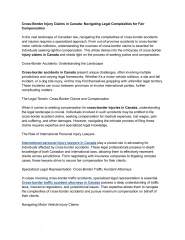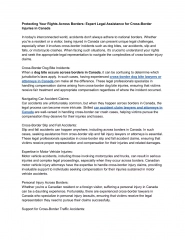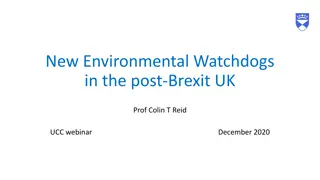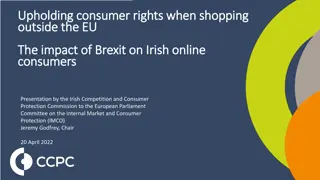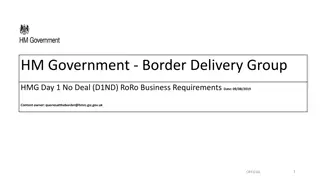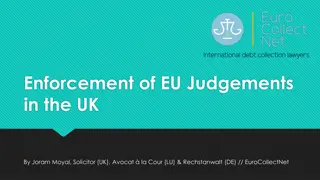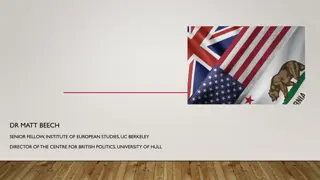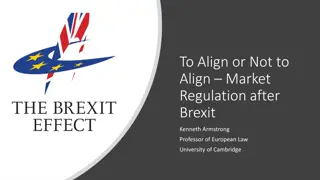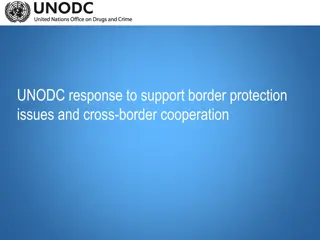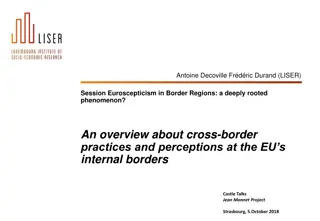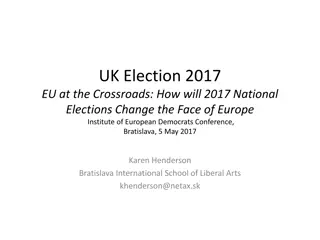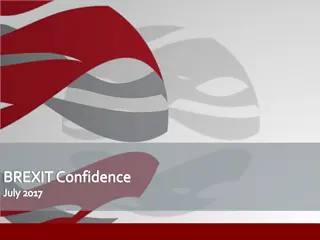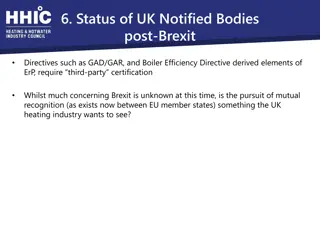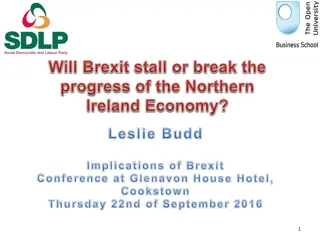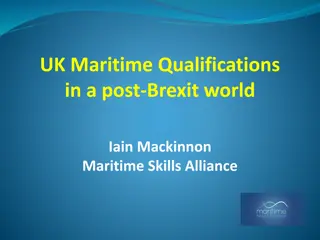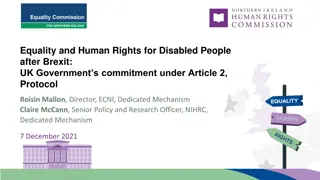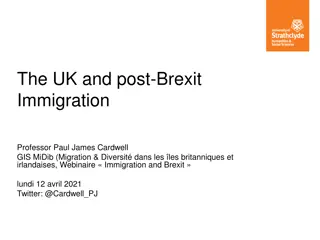Implications of UK-EU Border Changes Post-Brexit
The analysis delves into the potential impact of Brexit on the UK-Ireland border, focusing on migration, controls, and cross-border movement. It explores existing policies, historical contexts, and possible future scenarios, emphasizing the need for careful consideration and adjustments to navigate the evolving landscape.
Download Presentation

Please find below an Image/Link to download the presentation.
The content on the website is provided AS IS for your information and personal use only. It may not be sold, licensed, or shared on other websites without obtaining consent from the author.If you encounter any issues during the download, it is possible that the publisher has removed the file from their server.
You are allowed to download the files provided on this website for personal or commercial use, subject to the condition that they are used lawfully. All files are the property of their respective owners.
The content on the website is provided AS IS for your information and personal use only. It may not be sold, licensed, or shared on other websites without obtaining consent from the author.
E N D
Presentation Transcript
David Anderson Q.C. Independent Reviewer of Terrorism Legislation Belfast, 13 December 2016
Nearly 300 formal crossing points Many informal ones 23,000-30,000 cross-border commuters daily EUR 60bn p.a. in two-way trade ANPR, but no impediments to persons No duties or customs checks on goods
Our open border is the biggest symbol, perhaps, of the normality and development of north-south relations. The fact is that no one can be 100% certain about what the impact of the border will be if the UK decides to exit the EU .
Special travel zone UK IoM CI - Ireland CTA nationals travel freely Non-CTA nationals: significant policy coordination and practical cooperation: EU citizens: same legal obligations Non-EU citizens: UK-Ireland visa data exchange, joint visa schemes (India, China 2014) Permitted by Protocol 20 to TFEU
1939-1952 UK controls on Irish Sea crossings 1952: similar immigration policy agreed 1970 late 1990s border security controls 2009: HL rejected routine control of passengers travelling within CTA by air/sea Operation Gull: illegal entry by air/sea
UK/Ireland, 3rdcountry citizens: little change if CTA survives? If new UK restrictions on other EU citizens: Control at Irish external frontier (legal/practical?) Control between RoI and NI? (practical?) Control between NI and GB? (politics?) Internal controls in UK? Impact of technology?
Short of the introduction of full immigration controls on the Irish land border, the solution would either be acceptance of a low level of cross-border movement by EU workers, or allowing Northern Ireland to reach its own settlement on the rights of EU citizens to live and work there [requiring] an adjustment to the devolution settlement. (para 125)
strengthened checks for UK and Irish citizens at the sea boundary between Northern Ireland and Great Britain would be politically divisive and inherently undesirable. Other solutions must be identified (para 142)
Inside single market, outside customs union Duties on non-UK origin goods Duties on agricultural goods More opportunities for smuggling EU would have to approve arrangements
The only way to retain the current open border in its entirety would be either for the UK to remain in the customs union, or for EU partners to agree to a bilateral UK-Irish agreement on trade and customs. Yet given the EU s exclusive competence to negotiate trade agreements with third countries, the latter option is not currently available. (para 105)
ANPR on all 80 road crossings Green lanes closed to dutiable goods Every lorry stops at dual-control customs station to make a declaration (8 minutes) Spot checks, X ray facilities, warehouses in red lanes: occasional 30-minute tailbacks
Outside single market, outside customs union Norway-type impediments remain More checks needed if standards diverge: Food safety Plant safety Pharmaceutical safety Packaging
It is inconceivable that a vote for Brexit would not have a negative impact on the North/South Border, bringing cost and disruption to trade and to people s lives. - Rt Hon. Theresa May MP, 21 June 2016



